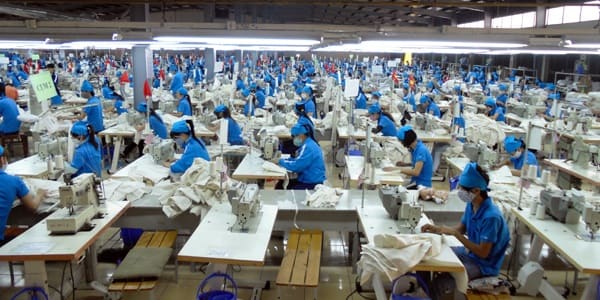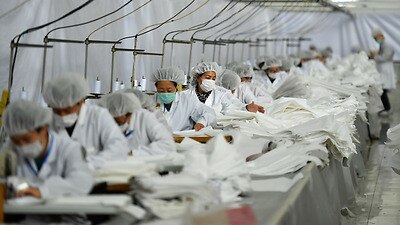We can clearly see the negative influences of the Covid-19 epidemic on the global economy in 2020, including the garment and textile industry. This situation may be continued in 2021. Experts forecast the export turnover of the Vietnam Textile and Garment industry in 2021 will be equal to 2019, reaching about 38-39 billion USD.
Vietnam’s textile and garment exports in 2020
The large outbreak of coronavirus disease in many countries around the world has dramatically reduced the consumption of garments. Accordingly, the disrupted supply chain of raw materials and the number of orders dropped sharply causing Vietnam’s textile and garment export turnover in 2020 to only reach 35.29 billion USD, down 3.6 billion USD compared to 2019.

Export turnover of Vietnam textile and garment reach $35.29 billion in 2020. Image source: Apparel Resources
Although not achieving the growth results as originally set out, Vietnam’s textile and garment still have a lower decrease in growth compared with many countries in the world. In the global context, the world textile and apparel industry in 2020 have total demand decreased by 25%.
>>> See another article: Vietnam textile and apparel industry in the trend of international integration
Forecast Vietnam Textile and Garment in 2021 will face many challenges and difficulties
After the travel and aviation industries, textile and garment was the next industry to be hard hit by Covid-19. According to statistics of the Ministry of Industry and Trade, the export turnover of the Vietnam textile and garment industry in the first 10 months of 2020 has decreased by 9.3% compared to the same period last year.
2021 continues to be influenced by Covid-19
Entering 2021, Vietnam continues to face many risks and challenges in an uncertain world economic environment. The resurgence of the Covid-19 epidemic in many countries is accompanied by blockade measures that continue to prolong the time of supply chain discontinuity in 2021, making the stamina of businesses weaker and weaker. This leads to the situation that if the enterprise wants to survive, it is imperative that they find effective solutions and directions.
Even if domestic epidemics are well controlled, many manufacturing and services working-orient in the export field may face long-term problems.

Covid19 has changed the consumer behavior of its customers globally, drastically reducing the demand for garments. Image source: sbs.com.au
>>> See another article: Overview of Vietnams Garment and Textile Industry Nowadays
The Vietnamese garment industry adapt to the new situation and change its direction
With what Vietnam’s textile and garment have gone through in 2020, experiences drawn and applied for better development in the coming years include:
- Raise the production capacity following the modern models
- Implement digital transformation in operation activities, especially in the production management process, storage, production and logistics.
- Try to forecast risks exactly and gives solutions well; change adapts quickly in production directions and produces non-traditional products…
- Make timely right decisions, adapt and seize opportunities through the smallest.
- International relations: In the world economic situation still volatile comply by complicated epidemic diseases, the Vietnam businesses sent messages to international organizations, called on international customers to respect the terms signed in the contract and get responsible for materials and orders that committed to performing. The consent of the customer helped reduce the pressure for the Vietnam garment businesses. The customer’s consensus and support are very valued and appreciated.
In 2020, Vietnam has signed two important trade agreements, EVFTA and RCEP that opening up many opportunities for Vietnamese textile and garment exports in the coming years.
+ The European Union Vietnam Free Trade Agreement (EVFTA) signed and officially took effect from 1rst August 2020. From its working, this agreement has brought about positive results, helping to increase the Vietnam export turnover of goods general and apparel products particular to the EU market.
+ The Regional Comprehensive Economic Partnership (RCEP) signed on 15th November 2020, is a free trade agreement consisting of 10 ASEAN members and 5 countries to which ASEAN has signed the free trade agreement (Australia, China, Japan, Korea and New Zealand). RCEP is less strict than EVFTA, which is forecast to expand many potential export markets for Vietnamese enterprises such as the market of China, Japan… In addition, RCEP also creates motivation and opportunities to exchange, distribute, develop textile and garment technology as well as helping to solve the shortage of input materials.
Contact to the recruitment consultant agency in the garment and textile field
Advisewise Consulting Group’s consultant team trained professionally and have a deep understanding of the Garment and Textile field. They perform advisory services, especially recruiting services at the Intermediate/ Senior Personnel level. Using our services, candidates have the opportunity to come closer to attractive vacancies such as Merchandiser, Production Manager, QA / QC, Designer, Pattern Marking, …
You are a candidate looking for a better job or a partner who wants to cooperate with us? Do not hesitate to contact us at the below information:
Advisewise Consulting Group
Add: 14th Floor, Nam Cuong Building, Km4 To Huu street, Ha Dong district, Hanoi
Hotline: 024 3204 7050
Email: contact@advisewise.com.vn
Website: https://www.advisewise.com.vn/
Fanpage: AdvisewiseFanpage


